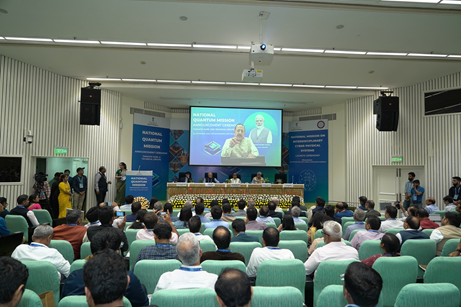“The National Quantum Mission is more than just a quantum initiative. It is a strategic investment in India's future, laying the groundwork for economic growth, job creation, and technological leadership in the quantum-driven world,” said Union Minister Dr. Jitendra Singh at the Announcement Ceremony of Thematic Hubs and Technical Groups National Quantum Mission (NQM).
Addressing the ceremony through a video message, Union Minister of State (Independent Charge) for Science and Technology, Minister of State (Independent Charge) for Earth Sciences, MoS PMO, Department of Atomic Energy and Department of Space, MoS Personnel, Public Grievances and Pensions, Dr. Jitendra Singh lauded the establishment of four Thematic Hubs (T-Hubs) comprising of 14 Technical Groups (17 Project Teams) across 17 states and 2 Union Territories. These hubs bring together a total of 152 researchers from 43 institutions, including 31 Institutes of National Importance, 8 research laboratories, one university and 3 private institutes. This initiative reflects the nation's collective ambition to lead in the rapidly evolving field of quantum technologies.
“The National Quantum Mission is a key pillar in realizing the Prime Minister Shri Narendra Modi’s vision of Atmanirbhar Bharat and Viksit Bharat 2047, reflecting our determination to be at the cutting edge of quantum technologies that will shape the future,” stressed Dr Jitendra Singh.
NQM is one of the nine missions under the Prime Minister’s Science Technology Innovation Advisory Council (PMSTIAC), created to leverage scientific research and make India a global leader in quantum technology. By advancing secure quantum communication, quantum computing, and precision sensing technologies, the mission is set to revolutionize fields like telecommunications, defence, finance, and healthcare, driving lasting societal impact.
One of the key strengths of these dynamic T-Hubs, as highlighted by the Minister, is their multi-disciplinary approach, which brings together experts from diverse fields like physics, computer science, engineering, and material science, thereby collaborating with academia, industry, and government to drive holistic advancements in quantum technology.
These hubs will play a crucial role in bridging the gap between research and industry, ensuring that innovations developed here lead to tangible advancements in the marketplace, benefiting sectors like telecommunications, defence, sensing & metrology, and healthcare.
NQM will provide critical support to startups and entrepreneurs, fostering a vibrant ecosystem for quantum-driven innovations and ensuring that India becomes a hub for quantum entrepreneurship. The mission will create jobs in emerging quantum technology sectors, building a highly skilled workforce in quantum computing, communication, and materials science—sectors that will define the jobs of tomorrow.
Dr. Jitendra Singh called NQM as deeply integrated with other national initiatives like ‘Make in India’ and ‘Digital India’, promoting technological self-reliance in critical areas and ensuring that India remains at the forefront of global technological development.
NQM is designed to ensure the sustained growth of India’s quantum ecosystem over the long term, with a focus on building capacity, funding research, and creating a lasting impact on India’s technological capabilities, added the Minister.
For the success of the National Quantum Mission, Dr. Jitendra Singh called on academia, industry, and the scientific community to join forces and ensure that India emerges as a global quantum superpower. “Together, we will lead the world in quantum innovations, ensuring that India sets the pace for scientific discovery and industrial transformation on the global stage,” reiterated the Minister.
“BharatGen is a proud example of India's commitment to advancing homegrown technologies, by positioning India as a global leader in the field of Generative AI, much like our achievements with UPI and other innovations that have transformed various sectors,” said the Union Minister Dr Jitendra Singh at the launch of BharatGen National Mission on Interdisciplinary Cyber-Physical Systems.
This initiative marks the world's first government-funded Multimodal Large Language Model project focused on creating efficient and inclusive AI in Indian languages. A key element of BharatGen is its open-source foundational models, which will help democratize AI across India. By making AI more accessible, a collaborative ecosystem would be created, where researchers and developers can work together to build innovative solutions.
“BharatGen directly aligns with the vision of Atmanirbhar Bharat as we are not just users but producers of innovative AI that reflects the diverse needs and cultures of our nation,” highlighted the Minister.
Emphasising on the linguistic and cultural diversity of our country, the Minister stated that BharatGen prioritizes social equity, ensuring that AI benefits and respects all segments of society.
Underscoring our commitment to 'Make AI in India, Make AI for India', the Minister referred to BharatGen as a perfect example which is designed to support industry, government, and public welfare, ensuring that everyone can benefit from the transformative power of AI.































